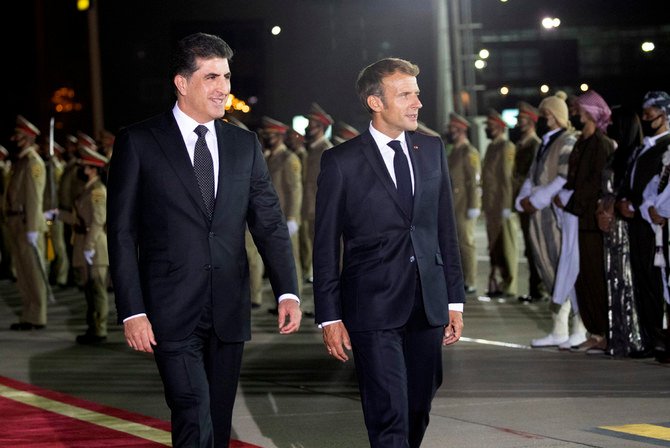
- ARAB NEWS
- 15 Jul 2025

Turkey and France this summer pledged to ease the tensions between them and open a fresh page in relations, but new areas of rivalry may occur between these two NATO allies.
After Turkish President Recep Tayyip Erdogan and his French counterpart Emmanuel Macron met on the sidelines of the NATO summit in Brussels in June and vowed to resolve their differences, French Foreign Minister Jean-Yves Le Drian declared that Ankara and Paris were in what he described as a “recovery period.” The Turkish foreign minister even paid a two-day visit to Paris ahead of the NATO summit — the first high-level diplomatic contact between the two countries after months of rising tensions.
On the Turkish side, outreach to France was part of a broader reset in ties with the EU, but the “recovery period” is yet to show whether Ankara and Paris will agree to disagree on several topics they have clashed over in the past.
Needless to say, despite being NATO allies, the points of contention between the two countries are many, including Syria, the Eastern Mediterranean, North Africa, the Caucasus, and Iraq. They have taken opposing positions in each of these conflicts. France was critical of Turkey’s support for Azerbaijan against Armenia during last year’s conflict over the Nagorno-Karabakh enclave, while Ankara was irritated by Paris’s close relations with the Kurdish militias in Syria that it considers to be terrorist.
Moreover, Turkey and France backed opposing sides in Libya and this was also reflected in the broader Eastern Mediterranean region. France’s sending of naval assets to the Eastern Mediterranean to support Greek warships at Turkey’s expense further escalated the tensions. In response to France’s growing security partnerships with Greece and Egypt, Ankara consolidated its presence in Africa, especially with former French colonies like Niger, Mali and Algeria, which raised eyebrows in Paris. Ankara has even signed a number of economic cooperation and defense agreements with these countries — a clear challenge to French influence.
Erdogan and Macron both engaged in tit-for-tat criticisms as the two ambitious leaders competed for international influence. In an attempt to rally the EU to impose sanctions on Turkey for its actions in Libya and the Eastern Mediterranean, France called on the bloc’s top diplomats to discuss “the Turkish question,” which earned a harsh response from Ankara. Relations reached rock-bottom last October, when Erdogan said Macron needed “mental checks” and expressed his hope that France would “get rid of” him as soon as possible.
Despite all these bitter developments, the two countries have taken some steps toward reconciliation. However, Macron’s recent visit to Iraqi Kurdistan, where Turkey has a meaningful influence, has raised questions about whether the Kurdish region could turn into a new area of rivalry between Turkey and France.
Macron was the only EU leader to attend the regional summit held in Baghdad last month to promote cooperation and partnership. While some countries were represented at the head of state level, some sent their foreign ministers instead, including Turkey. Following the summit, Macron’s next stops were in Mosul and Irbil, cities that are critical to Turkish interests. After a meeting with Iraqi Prime Minister Mustafa Al-Kadhimi, Macron vowed to continue supporting Iraq and said he would maintain France’s anti-terrorism military presence in the country, even if the US withdraws.
Thus, the withdrawal of the US and the general indifference of other EU countries have given the opportunity for France to play a greater role in regional issues. Macron’s participation in the Baghdad summit was a clear indication he intends to move in that direction.
France, which pursues an ambitious and individual strategy in the region, wants to fill the American vacuum in Iraq and the Kurdistan region.
Sinem Cengiz
The French president’s visit to Iraqi Kurdistan could also be seen from a different aspect, instead of a broader Iraqi dimension. In his first visit to Irbil, Macron met Kurdish Regional Government President Nechirvan Barzani, who previously met with the French leader on a visit to Paris in March. Macron also met with Kurdistan Democratic Party leader Masoud Barzani.
Nechirvan Barzani, who also enjoys good relations with Ankara, hailed the French support for Iraqi Kurdistan, where more than 35 French companies operate, according to Rudaw. France currently has more than $3 billion worth of investments in Iraq, 30 to 35 percent of which are in the Kurdistan region.
Macron then travelled to Mosul to meet with political and religious figures. He even announced that France would open a consulate there soon, pledging that it would support the reconstruction of the city. Macron was also planning to visit Sinjar, where tens of thousands of members of the Yazidi religious minority fled in 2014 to escape Daesh, but this visit was canceled. Last year, Nechirvan Barzani praised a French aid organization’s plan to build a hospital in Sinjar.
While France, which pursues an ambitious and individual strategy in the region, aims to fill the American vacuum in Iraq and the Kurdistan region, Irbil seeks to increase its partners at the global level, especially after how the world reacted to its independence referendum in 2017. However, increasing its sphere of influence in Iraq and the Kurdistan region might not be an easy task for France, as Turkey is likely to appear as a competitor that strongly wants to hold on to its own influence there.